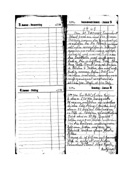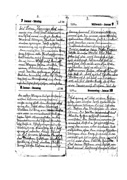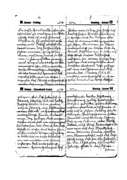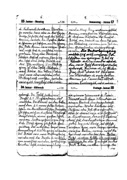The Evacuation of Paschkerwitz |
Preparation
In January 1945, the war was still continuing on all fronts. We had to listen to the reports of casualties at the front, and endure the rationing of food, clothing and fuel. There were also blackouts, and we had to give shelter to people from the west that had lost their homes in bombing raids. So far, we in the east had felt secure. However, we were alarmed when Breslau, only 12km away, was bombed. Apart from this event, we never felt in any immediate danger.
On the 20th of January, all the villagers were shocked when they were ordered to evacuate on the following day. We were told that this was a precautionary measure, and that we would return home in about two weeks time. Each person was allowed to take 20 pounds of luggage. We were also advised, that the Home Guard would ensure the security of our homes until our return.
A few neighbors assembled in front of our house to discuss the situation. People had to accept the fact that Germany was going to lose the war. While we were still debating the turn of events, we noticed a column of troops approaching from Hartwasser. Instead of the field grey uniforms of German soldiers, we saw the olive green of the Soviets. Our dismay was short lived however when the commanding officer explained that they were Hungarians returning home. In addition, we also learned that Russian troops were not far away. The seriousness of the situation was now apparent to all, and everyone hurried home to make preparations for tomorrow’s departure.
Soon afterwards, a new announcement came, ordering us to be ready to leave in three hours’ time. We were alarmed to find how little we could take with us. The temperature on this day was – 20 Celsius (-4 Fahrenheit) and we decided to wear as many clothes as possible. We also had to think of bedding for the night, and provisions for the days ahead.
Unknown to us, the farmers had been ordered to prepare the wagons in advance, and they were ready and waiting for us in the barns. Each farmer was responsible for a certain number of people; we were assigned to our neighbor farmer Gerbatsch. At the start, there were 15 adults and two children in our group. The pair of horses pulled two carts, the first one was open and carried the baggage and horse feed; the second one was covered, and had room for a few seats and our bedding.
Departure
The order to march was given at 5:00 P.M. It was already dark and we didn’t get any farther than Henningsdorf. The locals could not believe that we had come from a nearby village because news of an imminent evacuation had not reached them. Since the hour was late, there was no time to organize accommodation for us, and so we had to be content with spending an uncomfortable night in the barn of the estate. At least it was warm on the straw among the cows. About 5:00 A.M. we had to leave the barn because the cows had to be milked and fed. The farm hands couldn’t know that within a few hours they would have to share our fate and evacuate their homes.
|
If, years later, an evacuee was asked what he remembered most about the march from Paschkerwitz, his answer would most likely be, the first night in the cow barn. However, there were times when we would have been only too happy to spend the night in a warm barn among animals. Another memory was the frozen bread which sustained us during our long trek. |
The long march
After an early start, without any breakfast, we continued our journey. Soon we stopped to have something to eat. However, by this time all our food was frozen and we had to nibble on solid chunks of bread. In the evening, we stopped at a village, which had already been evacuated. Although we were allowed to spend the night in the houses there, we still felt a little like uninvited guests.
The next day saw us trudging through the snow behind the wagon again. If you were tired you were permitted to ride in the wagons. However, if you did ride, your feet soon became as cold as ice. In the meantime, we encountered other people fleeing westwards. We had to be careful at cross roads, in order to avoid being separated from our group. As we progressed, the temperature dropped even more. One day, we were caught in a snowstorm so thick, that we could not see the wagon in front of us, so we kept together by holding on to a rope fastened to that wagon.
By this time we had established a routine. As soon as it was light, we started walking and at the end of the day we looked for shelter. Often the villages were already full of refugees, and so we had to move on to the next one. We had long given up the hope of finding a warm place to stay, but were happy if we could find some kind of shelter. I can still remember a very cold night when we had to sleep on a church bench. On another occasion, after an especially strenuous day, we had to stay in an unheated hall. My mother panicked in the morning when she couldn’t wake me. I was cold and stiff but after frantic efforts to revive me I was able to get up.
|
At the start of the trek, there were old people and babies in the wagon train who were lucky to be taken by truck to safety. They would not have survived the journey otherwise. In other treks, these people were not so fortunate.
|
Until now we had only used the side roads because the main highways were reserved for the military. Soon we arrived in Leubus, where it was necessary to cross the river Oder. Here we had to wait until the army had finished moving troops and vehicles over the bridge. Nobody had to tell us to hurry when we learned that the bridge would be blown up at midnight. At the same time, we could hear the sound of heavy artillery behind us.
Rest
After several days, we reached Herrmannsdorf in the county of Jauer, where we were finally allowed to rest. Both people and horses needed a break. The local people had to provide us with accommodation. My own little group was lucky to be assigned to a large cabin, which had recently been used to house prisoners of war. It was a luxury for us to sleep on straw mattresses in proper beds, and to wake up the next day in a warm room. We also received normal rations of food and for a time, considering the circumstances, we felt reasonably content. However, the hope of a prompt return to our homes was now completely gone.
The march resumes
Soon, day and night, we again heard the noise of heavy artillery, and there was a red glow in the eastern sky. This meant that the fighting was getting closer, and so we were not surprised when the order came to leave. Once more, we had to join the endless columns of refugees moving west. Soon, we came to the mountains where a new problem arose; the farm carts from the plains had no brakes, so we improvised by using poles as levers on the wheels. Going uphill, we all had to help the horses by pushing the wagons. It was easy for a wagon to slip on the icy roads and occasionally in the ditches we saw overturned wagons. We also noted the despair of people who had started off with sleighs, and now had to abandon them when they came to roads without snow.
|
When the farmers and farm laborers were drafted into military service, foreign workers, including prisoners of war, replaced them. These people had been given the choice of either staying in the village or coming with us. All the Ukrainians and French prisoners, together with some Polish people, decided to come with us. They helped with leading the wagons and caring for the horses during the trek.
|
For many days we had to endure the hardships of the march. Frozen bread was our main food and had to be chopped into pieces with an axe. At one particular stop, Friedel and I, being the only two children in the wagon, were offered a bed for the night. After all those miserable nights in cold places, having a warm bed was an unforgettable experience. In addition, we were given a warm breakfast in the morning. I only remember one other occasion like this, and that was when the Red Cross gave us a warm drink. As if cold and hunger were not enough, we also had to beware of machine gun fire from low-flying allied warplanes. Luckily nobody was wounded on the one occasion when we were attacked.
Our trek stayed together until we reached Teplitz-Schönau (now Teplice), where the sick and infirm were taken farther west by train. Those remaining were split up and went to different destinations. In this way, many people from Paschkerwitz ended up in places that were later part of the American occupied zone, but we were not so fortunate.
By now, it was clear to us, that the war was coming to an end and there was no reason to continue marching. In Brüx (now Most in the Czech Republic), we were all sent to nearby villages. My family, and a few others, settled in Würschen (now Vrsany). In the distance, we could see the red glow over Dresden when the town was fire bombed and totally destroyed between the 13th and 15th of February 1945. Three months later, on the 9th of May, the invading Soviet Army took control of Würschen, and there followed an unpleasant time for everyone. Later, in 1946, we were expelled, together with the German population from the Sudetenland. We were sent to the Russian occupied zone, which later became the German Democratic Republic. The hope of returning to our homes in Paschkerwitz was lost forever.
Click to enlarge
|
Mrs. Fischer's DiaryHere is a list of most of the places where we spent the night. The only writing material available to Mrs. Fischer was the reverse side of a photograph showing her two daughters Monika (9) and Regina (4) Pawelwitz should read Pawellau |
Click to enlarge |
Our Evacuation Route
is marked in red on the map below. Areas marked pink in Poland and the Czech Republic were formerly part of Germany.





